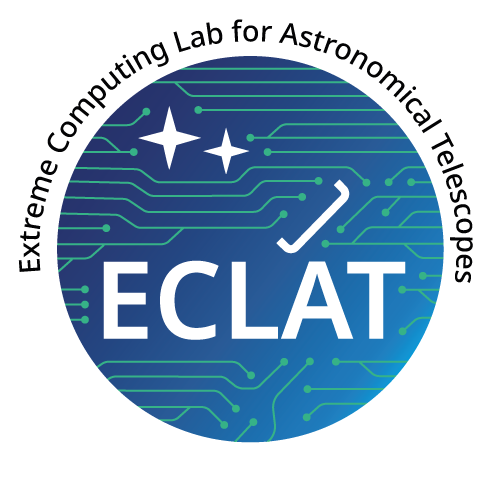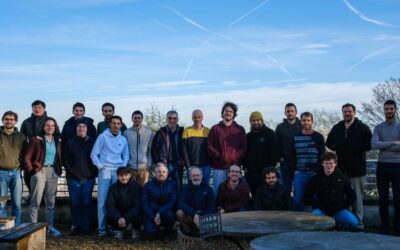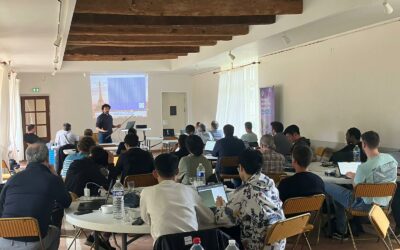2024 technical workshop
From 27 November to 29 November 2024, the ECLAT joint laboratory will be holding its first annual technical workshop on the theme of ‘SKA: radio astronomy in the continuum in the data deluge era’ at the University of Bordeaux. This event will bring together a multidisciplinary and cross-sectoral community to explore the challenges involved in setting up and operating new-generation research infrastructures in the field of radio astronomy, in particular around the SKA project.
SKA: continuum radio astronomy in the age of the data deluge
The next generation of large astronomical observatories such as the SKA will need to implement the full digital continuum, through a hierarchy of cyberinfrastructures. Fuelled by real-time scientific sensors at the edge, supercomputers will filter, combine, process and reduce these near-real-time data streams to generate high-level data products. These will then be distributed to the scientific community, which will have to rely on federated cloud infrastructures to analyse and produce scientific results.
- From 27 November to 29 November 2024
- At Bordeaux University’s Montesquieu campus
New challenges ahead
At a high level, the major challenges for the implementation and operation of this new model of large-scale research infrastructure include:
- Moving to a data flow approach to adapt to a paradigm shift in which raw data processed and reduced in real time is then disposed of
- Adapting the infrastructure’s development, operations, maintenance and refresh cycles to this new paradigm within a restricted budgetary envelope
- Managing a new scale of data volumes, up to exabyte scale
- Adapting software development cycles to increasingly heterogeneous hardware that is undergoing rapid and continuous change;
- Exploiting potential commonalities between the tools and services to be deployed across the continuum
- Sobriety and, more generally, managing and optimising the use of resources at a fine-grained level throughout the execution of the pipeline to adapt to different observation scenarios and the availability or cost of energy
This means that challenges along the continuum need to be addressed at the level of the overall system, rather than through a series of local optimisations, because improving one aspect of a given component or sub-system has repercussions on other parts of the continuum and can limit operational capabilities.
Bringing together a multi-disciplinary community
This first annual seminar of the ECLAT joint laboratory takes place in this context and aims to bring together a multidisciplinary and cross-sector community to address the major issues surrounding the construction and commissioning of this research infrastructure:
- Building blocks of a hierarchical architecture across the continuum design of data flow pipelines and analysis of radio astronomy applications
- Optimisation of overall energy consumption and implementation of self-configurable, energy-efficient systems
- System reliability and predictive maintenance strategies
- Artificial intelligence tools to reconcile precision and energy efficiency
- New modular hardware platforms, based in particular on European technologies;
- Advanced data management and federated resources for secure access
- Optimised use of large-scale distributed cyber-infrastructures
Presentations
Architectures and Tools for Large-Scale Workflows Exa-AToW
Access the presentation
ExaDoST Illustrator : A Preliminary I/O Study of Radio Imaging Components
Access the presentation
Model Based Granularity Optimization for High Performance Computing Systems in Astronomy / Project SEAMS
Access the presentation
ODISSEE Project
Access the presentation
PhD Projects
Access the presentation
Co-design for SKA
Access the presentation
Benchmarking tools for SKAO pipelines
Access the presentation
Advancing radioastronomy into the era of High Performance Computing: the case of Imaging
Access the presentation
EXTRACT: preparing large-scale radio interferometric data processing in the SKA era
Access the presentation
Discovering and studying AGN components of blazars with LOFAR and its long baselines
Access the presentation
Parallelizing radio-interferometric image reconstruction by baselines
Access the presentation
What exciting features the BXIv3 Interconnect network offers to applications?
Access the presentation
Eviden projects & tools for large applications efficiency optimisation
Access the presentation
SKA Activities in CEPP
Access the presentation
SiPearl
Access the presentation
Understanding SKA’s IO requirements: experience feedback
Access the presentation
In search of guaranteed scheduling strategies for radio astronomy observations (in French)
Access the presentation
PERDRIX Project
Access the presentation



